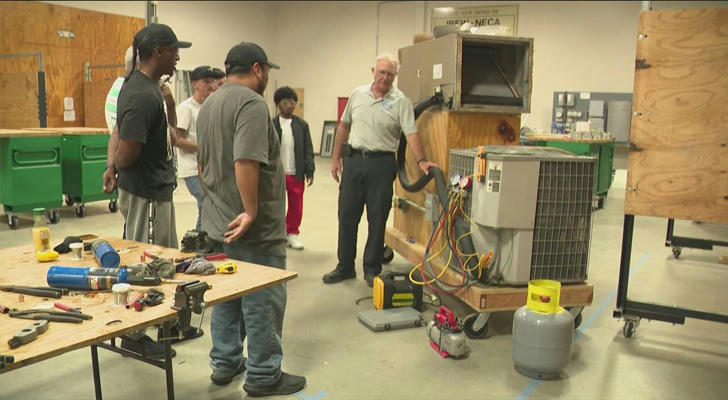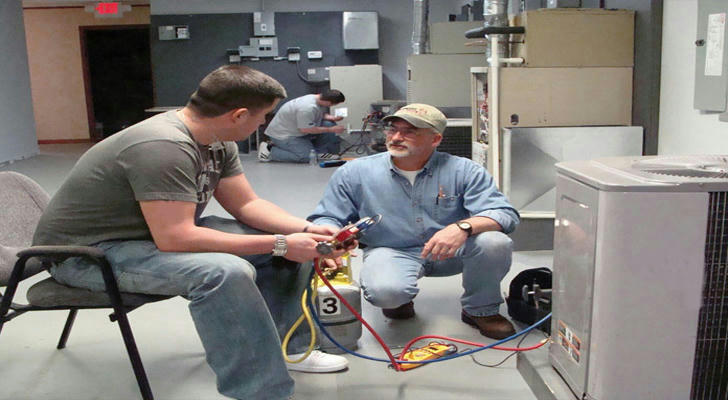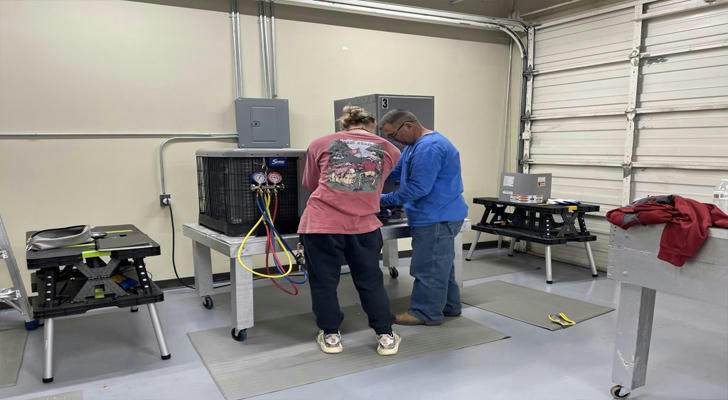Government-Supported HVAC Technician Training: A Practical Path to Career Growth
Are you seeking a stable and rewarding career in a growing field? U.S. government-supported HVAC (Heating, Ventilation, and Air Conditioning) training programs offer a valuable opportunity to "earn while you learn." These programs provide hands-on experience combined with classroom education, helping participants build in-demand skills for the modern job market.

Why Choose Government-Supported HVAC Programs?
1. Growing Industry with Long-Term Potential
The HVAC industry is rapidly expanding due to rising demand for energy-efficient climate control systems, aging infrastructure, and the increased frequency of extreme weather events.
According to the U.S. Bureau of Labor Statistics (BLS):
Employment for HVAC mechanics and installers is projected to grow 6% from 2022 to 2032, faster than the average for all occupations.
An estimated 37,700 job openings are projected each year over the decade, due to both industry growth and retirements.
Technicians with up-to-date training and environmental certifications are especially valued.
2. Strong Career Development Opportunities
Government-supported programs often offer structured learning paths from apprentice to technician, and later to supervisory or specialist roles. Certified technicians are frequently considered for leadership positions within HVAC firms or are able to start their own service businesses.
3. Reliable Job Stability
Climate systems are essential in every residential, commercial, and industrial setting. As a result, HVAC jobs are not easily outsourced or automated, and technicians enjoy consistent demand even in uncertain economic times.
4. Industry-Recognized Certifications
Trainees can earn credentials such as:
EPA Section 608 Certification
NATE (North American Technician Excellence) Certification
OSHA Safety Training Certification
These qualifications significantly enhance employability and long-term career growth.
Who Can Benefit?
✅ Young Adults (18–30): Skip long academic programs and enter the workforce with practical skills.
✅ Career Changers (31–50) : Ideal for those transitioning from retail, construction, or manufacturing industries.
✅ Older Adults (50+) : Welcomes individuals of all ages. HVAC work can range from physically active fieldwork to more technical, diagnostics-based roles.

Types of Government-Supported HVAC Programs
Workforce Innovation and Opportunity Act (WIOA)
Provides tuition and support services for unemployed or underemployed individuals. Courses are typically offered by local community colleges and technical institutes.WIOA is a federally supported program that provides job training, including in the HVAC field, to low-income and unemployed individuals. Qualified trainees can receive financial support to take HVAC training courses and become certified. These courses are typically offered through community colleges or technical colleges.
| College/Institution | Course Content | Support Type |
|---|---|---|
| Long Island Technical Institute | Offers HVAC certification courses to gain industry accreditation | WIOA program, students can receive tuition assistance |
| Northern Virginia Community College | HVAC system installation and maintenance training | WIOA program, provide support for government programs |
| Los Angeles City College | Comprehensive HVAC system installation and repair courses | Provide federal scholarships, eligible students can apply |
| Claremont-Lafayette Technical College | HVAC training courses and certification | Federal Student Loan Programs and WIOA Funding |
Veterans Affairs (VA) Programs
The VA provides funding for veterans to receive HVAC training. Veterans can use the GI Bill or other VA-funded programs to take government-supported HVAC courses to help them transition into the job market.
Apprenticeship Programs
Many government-supported apprenticeship programs provide paid internships where students gain hands-on experience on the job while taking specialized HVAC courses. These apprenticeship programs are often offered through partnerships between trade associations and employers and are ideal for learning HVAC skills.
What You’ll Learn in HVAC Training
HVAC training blends theory with practice and covers topics such as:
System Installation – Residential and commercial HVAC unit setup
Maintenance & Troubleshooting – Diagnose electrical and mechanical issues
Energy Efficiency Standards – Work with modern eco-friendly technologies
Safety Procedures – Handling refrigerants, electrical systems, and proper ventilation
Blueprint Reading & Wiring Diagrams – Technical reading and system layout comprehension
Some programs also incorporate soft skills training, such as customer service and project management.
How to Apply: Step-by-Step Guide
Research Programs
Use platforms like CareerOneStop or local workforce boards to find WIOA-approved or VA-funded HVAC programs.
Check Eligibility
Most programs require a high school diploma or GED, and may include basic math and mechanical reasoning assessments.
Prepare Your Application
Gather documents including transcripts, proof of residence or veteran status (if applicable), and a resume.
Interview or Aptitude Test
Some programs include an entry assessment to evaluate readiness and motivation.
Begin Training
Once accepted, you can start learning and gaining field experience simultaneously.

Real-Life Case Study: From Hospitality to HVAC
Mark, a former waiter, faced job insecurity and limited career growth. After attending an info session at a local workforce center, he applied for a WIOA-funded HVAC certification program. During training, he completed a hands-on internship with a regional HVAC contractor. After certification, he was hired full-time and has since advanced to a team lead role, supervising installations and mentoring new trainees.
His journey demonstrates how accessible training can lead to a complete career transformation.
Conclusion
HVAC is a resilient, growing field with opportunities for individuals at all stages of life. With the support of government-backed training programs, you can gain valuable skills, obtain certifications, and launch a stable and rewarding career.
